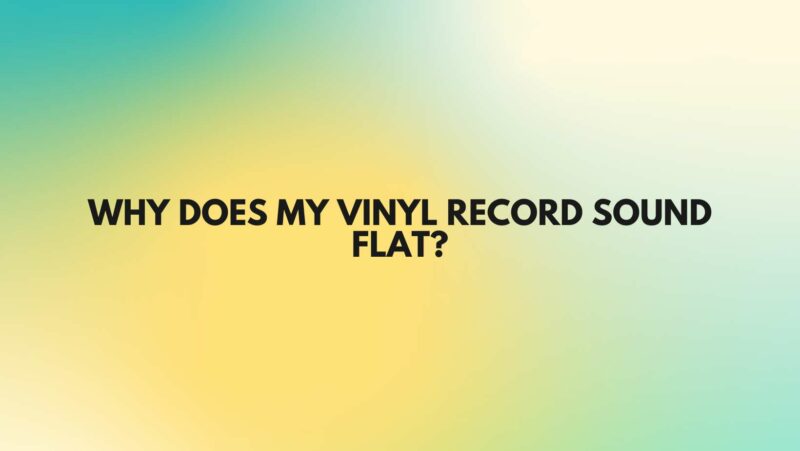Vinyl records, with their rich analog warmth and tactile experience, have rekindled the passion for physical music in today’s digital age. However, vinyl enthusiasts occasionally encounter an issue that can be frustrating: the perception that their vinyl records sound “flat.” This term refers to a sonic quality characterized by a lack of depth, dynamics, and vibrancy in the music. In this comprehensive article, we’ll delve into the many factors contributing to the phenomenon of flat-sounding vinyl records and explore possible solutions to elevate your vinyl listening experience.
- Record Quality and Pressing
The foundation of vinyl sound quality is the record itself. The pressing quality, vinyl material, and mastering process can significantly influence how a record sounds. Low-quality pressings, subpar vinyl material, or poor mastering can all contribute to a flat sound.
Solution: Invest in well-pressed, high-quality vinyl records from reputable labels or choose remastered editions known for their superior audio quality.
- Turntable Setup and Calibration
The setup and calibration of your turntable play a pivotal role in achieving optimal sound from vinyl records. Several elements of your turntable setup can affect the perceived flatness of the sound:
a. Tracking Force: An incorrect tracking force can cause distortion and uneven wear on records, resulting in a flat sound.
b. Anti-Skate and Tonearm Alignment: Proper tonearm alignment and anti-skate adjustment ensure the stylus tracks the grooves accurately.
c. Cartridge Quality: The choice of cartridge can significantly impact sound quality, with higher-quality cartridges providing better tracking and detail.
Solution: Refer to your turntable’s manual or consult a professional to ensure the correct setup and calibration. Consider upgrading to a higher-quality cartridge for improved sound.
- Cleanliness and Maintenance
Dirt, dust, and debris on your records can introduce surface noise and impact sound quality. Moreover, a dirty stylus can lead to distorted playback.
Solution: Regularly clean your vinyl records using a dedicated brush or cleaning solution. Keep the stylus clean using a stylus brush and cleaning fluid. Store your records in protective sleeves to prevent dust buildup.
- Turntable Components
The components of your turntable, including the platter, belt, and motor, can affect playback quality. Worn or damaged components may result in inconsistent speed and, subsequently, a flat sound.
Solution: Maintain your turntable’s components properly, and consider upgrading to higher-quality components for improved performance.
- Amplification and Speakers
Your amplification and speaker setup have a profound impact on the perceived sound quality of vinyl records. Insufficient amplification or subpar speakers may not reproduce the nuances and depth of the music accurately.
Solution: Invest in a high-quality phono preamp and amplifier that match your turntable. Pair them with quality speakers suitable for vinyl playback to achieve a richer and more dynamic sound.
- Record Wear and Damage
Vinyl records can wear out over time and accumulate damage, leading to pops, clicks, and a flat sound. Scratches and deep grooves can further degrade playback quality.
Solution: Handle your records with care, store them vertically, and utilize inner and outer sleeves to protect them. Avoid playing heavily damaged records, and consider replacing them if necessary.
- Room Acoustics
The acoustics of your listening environment can greatly impact overall sound quality. Poor room acoustics can lead to reflections, resonances, and a perceived lack of depth in the music.
Solution: Optimize your listening space by incorporating acoustic treatments such as rugs, curtains, and acoustic panels to minimize reflections and create a more balanced sound environment.
Conclusion
Vinyl records offer a unique and immersive listening experience, but achieving the best sound quality requires attention to various factors. When your vinyl record sounds flat, it’s essential to consider the quality of the record itself, turntable setup, cleanliness, maintenance, components, amplification, speakers, record condition, and room acoustics. By addressing these factors and making necessary adjustments, you can enhance the depth, clarity, and vibrancy of your vinyl playback, allowing you to fully embrace the analog charm of vinyl records.


